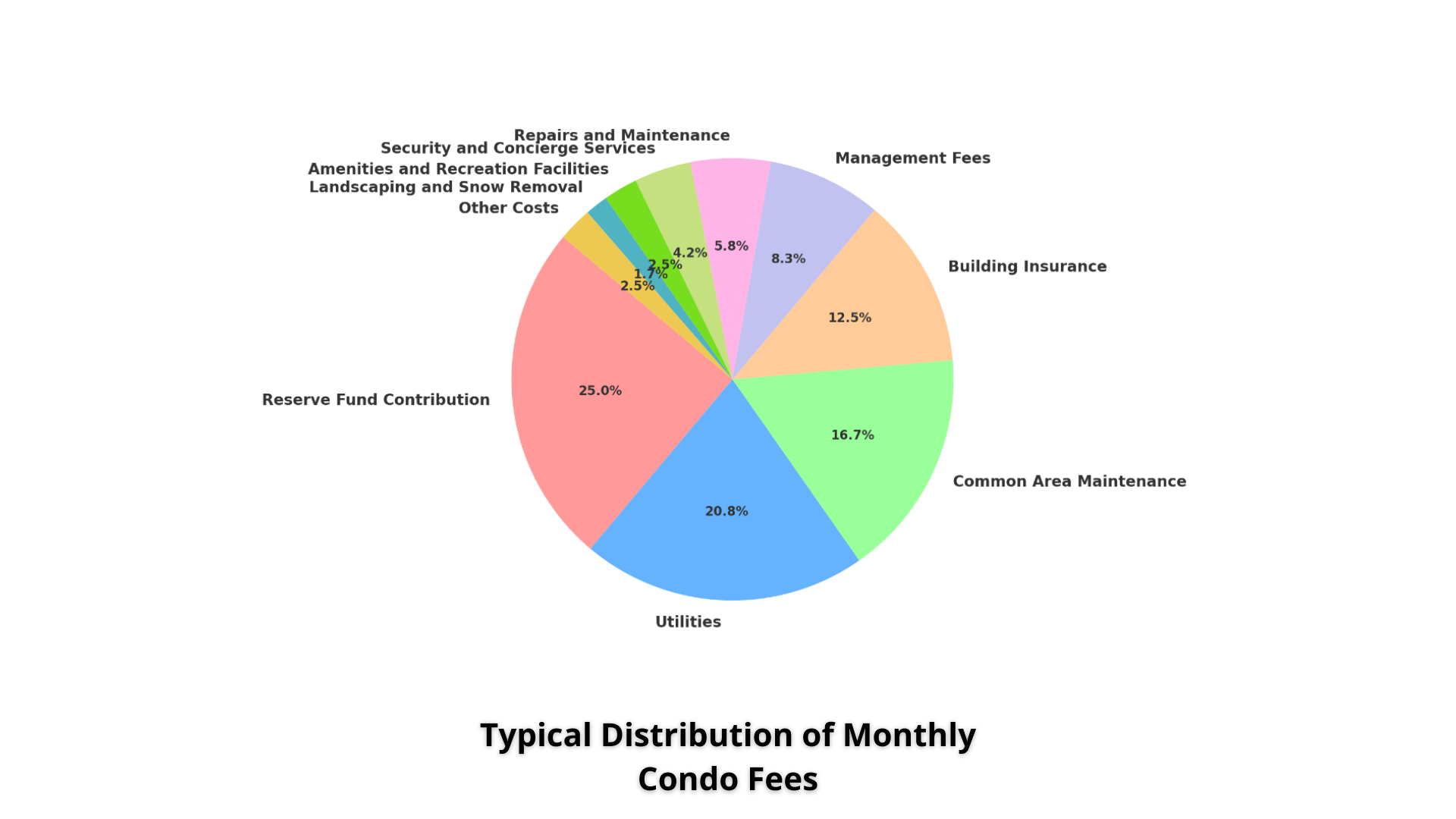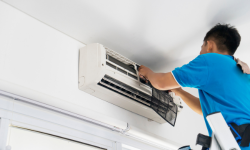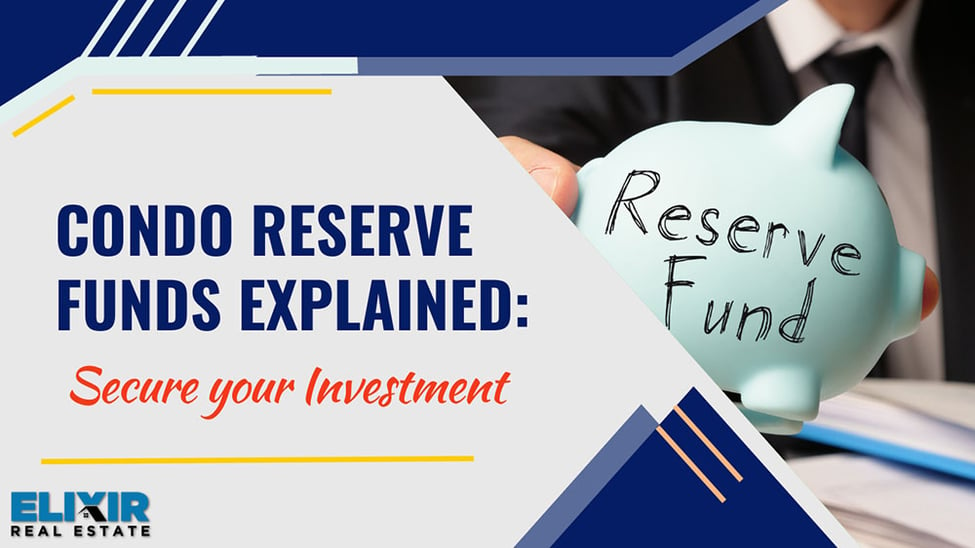Welcome friends to a fresh episode of Elixir Talks. In this episode, we’re uncovering the layers on a topic at the heart of condo living—‘Reserve Funds.’ We will discuss how Reserve funds impact us as a both as a Buyer and Seller in dealing with our Real Estate transactions.
Imagine you’re about to start on the journey of condo ownership. One critical factor that can make or break your decision is the financial pulse of the condo corporation. It’s the cornerstone for a buyer eyeing a valuable investment and for a seller aiming for a hassle-free sale. The reserve fund is a clear indicator of a condo's fiscal fitness.
What is a Reserve Fund?
Picture a savings account for your home on a larger scale. Just as we stash away funds for rainy-day home repairs, a condo complex pools resources for its maintenance needs. Whether it’s the repair of common walkways or the overhaul of essential systems, this fund is the backbone that ensures smooth operation without imposing unexpected expenses on the residents.
To give you some more examples it could be maintenance and upkeep of shared parking lots, rooftop terraces, roof shingles, HVAC equipment, building foundation, balcony maintenance, swimming pools, tennis or squash courts, repaving of the parking lots, repairing or replacement of elevators, windows and doors, electrical and mechanical systems, hallway maintenance, light fixtures replacement etc. This essentially is a pool of money which is set assist for contingency and future major repairs. It avoids the incoming residents to pay for the usage and wear and tear by the previous residents, it ensures all residents to contribute for this throughout the existence of condo.
Here in province of Ontario all of the condo corporations are required to maintain at least one reserve fund as part of their collection of monthly fees from the unit holders.
How Condo Reserves are Accumulated?

As part of a condo living, the unit holder pays a common expense fees, which is typically paid monthly to the condo corporation. This fees has multiple components like Operational expenses, management fees, concierge services, taxes, security personnel payroll etc and a portion of this fees is attributed to generate a corpus of Reserve Funds.
Every months this reserve fund grows and comes handy in case the condo  management needs budget to do any major repairs or replacements of the common elements or any assets of the corporation. I should highlight here that this reserve fund can strictly be used only for repairs of existing common elements and maintain their state and is not a tool to improve or do addition to the common elements.
management needs budget to do any major repairs or replacements of the common elements or any assets of the corporation. I should highlight here that this reserve fund can strictly be used only for repairs of existing common elements and maintain their state and is not a tool to improve or do addition to the common elements.
What happens if Reserve Fund is Low?
In the absence or underfunding of Reserve Fund pool, the corporation would need to rely on the special assessment and increase the monthly contributions of the residents to generate the necessary funds or look to borrow money in order to generate the funds which indirectly raises the fee as well. And if the maintenance projects which require Reserve Funds are postponed, they can become even costlier to fix at a later date and increase the overall cost for the owners. It might cause a safety risk also for the owners and residents.
 There is another indirect impact to the owners as if the long-term maintenance is not commissioned at due time, it would deteriorate the conditions of the building which has an impact on the value and saleability of units. The resale value as you see can be directly impacted if the conditions of proper maintenance of the complex don't happen due to a poorly funded Reserve Fund.
There is another indirect impact to the owners as if the long-term maintenance is not commissioned at due time, it would deteriorate the conditions of the building which has an impact on the value and saleability of units. The resale value as you see can be directly impacted if the conditions of proper maintenance of the complex don't happen due to a poorly funded Reserve Fund.
It's a common misconception to think that a hefty reserve fund negates the need for further contributions. However, regular input to the reserve is crucial. It acts as a financial shield for unexpected, often expensive, repairs that can emerge, particularly in older buildings and complexes.
Reserve Fund Study
A Reserve Fund Study is an activity which is done periodically by the condo corporation to assess their needs and determine if the reserve fund is adequate for the sustenance of the complex. For a newly formed condo corporation, it is done within a year of the creation of a condo declaration and description. There are three different types of reserve fund studies, Class 1 is the most comprehensive one and the first one to be completed where the study service provider does an in-person visit of the site to examine common elements, reviews documents and conducts in-person meetings with the stakeholders of the condo corporation. The legislated minimum for a Reserve Fund projection is 30 years. It depends upon the corporation if they want to do an even longer duration study with the service provider.
most comprehensive one and the first one to be completed where the study service provider does an in-person visit of the site to examine common elements, reviews documents and conducts in-person meetings with the stakeholders of the condo corporation. The legislated minimum for a Reserve Fund projection is 30 years. It depends upon the corporation if they want to do an even longer duration study with the service provider.
The updates to the Reserve Fund Study are in turn of two types: Class 2 is a study with a site inspection and Class 3 is a study without a site inspection. In the study, they build the entire inventory of all of the equipment and items of the condo corporation which might require an update and major repair or replacement within the next 30 years of the reserve fund study and where the replacement cost is at least $500.
In closing, I hope this talk sheds light on the significance of reserve funds in condominium ownership. Remember, it's not just about now; it's also about securing the future of your home and investment. If you have any topics in mind and would like us to discuss, drop in the comments and will certainly do. For any Real Estate matters reach out to our dedicated team here at Elixir and we will provide the best consultancy. Take good care and will talk to you soon!
Wish you all the very best! Reach out to our dedicated team at Elixir for any queries you have in Real Estate, and we will do our best to help.
Mudit Mehta
Broker of Record
ELIXIR REAL ESTATE INC.
Off: 416-816-6001 | [email protected]




